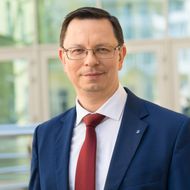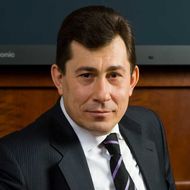HSE University Take Part in Developing and Signing AI Code of Ethics in Russia

HSE University Rector Nikita Anisimov, along with the heads of many other leading Russian universities and tech companies signed the National Code of Ethics in the field of Artificial Intelligence. HSE University experts took part in the development of this document. The presentation of the code and the signing ceremony took place at the first International Forum on "Ethics of Artificial Intelligence: the Beginning of Trust".
The National AI Code of Ethics codifies a set of ethical norms that represent a system of moral rules which are based on voluntary acceptance and implementation. The Code was developed in 2021 at the headquarters of the Alliance in the field of Artificial Intelligence together with the Analytical Center for the Government of the Russian Federation, the Ministry of Economic Development of the Russian Federation, as well as with the active participation of HSE University experts, and representatives from the academic and business community. The Code takes into account the requirements of the National Strategy for the Development of Artificial Intelligence for the period up to 2030, approved by the President of Russia.
Prior to the presentation of the code, a plenary session of the forum was held. Deputy Prime Minister Dmitry Chernyshenko, Head of the Management of the Russian President on the Development of Information and Communication Technologies and Communications Infrastructure Tatyana Matveeva, MTS President & CEO and Chairman of the Management Board Vyacheslav Nikolaev, CEO of Yandex in Russia Elena Bunina, President at InfoWatch Natalia Kaspersky, First Deputy Chairman of the Executive Board of SBER Alexander Vedyakhin, Chairman of Lenfilm's Board of directors and film director Fyodor Bondarchuk all took part in the event.
Deputy Prime Minister Dmitry Chernyshenko recalled that in December 2020, Vladimir Putin entrusted the AI community with developing an internal code of ethics. Dmitry Chernyshenko is confident that the developed code submitted for signing fully complies with the President's request.
He says that artificial intelligence is a civilizational project, and it is important that society and the state minimize the risks of using AI.

Dmitry Chernyshenko
‘We need to work so that society and its citizens felt confident that their rights are protected, to develop regulatory and ethical regulation of this sphere.’
The Deputy Prime Minister called Russia one of the world leaders in the application of AI, while at the same time, relying on the best global practices, ‘Russia is becoming one of the countries where ethics is put at the forefront of AI development.’
The Deputy Prime Minister considers transparency, protection of human rights, and precise wording to be the key principles of the Code. About 500 renowned experts took part in the development of the code. ‘We believe that this is a high-quality and important document, and its principles comply with UNESCO recommendations and UN development goals,’ sums up Dmitry Chernyshenko.
Tatiana Matveeva noted that the signing of the code will ensure a balance of interests for Russian and foreign companies in the market of AI development.

Tatiana Matveeva
‘The signing of the code will allow Russian developers to feel confident in bringing their products to international markets and ensure their acceptance by the international community. Life is developing, so in the future, the code should be open for revision in order to meet the current level of technological development.’
In addition to HSE University Rector, heads of the following companies and instutions signed the memorandum: Yandex, SBER, MTS, VK, Gazprom Neft, Rostelecom, Rosatom, Innopolis University, ISP RAS, ITMO, Kurchatov Institute, MGIMO, MIPT, Sirius Educational Centre, Skolkovo Foundation and CIAN.

Nikita Anisimov, HSE University Rector
We see that artificial intelligence is increasingly applied in real life - from the high-tech sector to public services, and the scale of its application will grow exponentially. According to experts, including HSE University, artificial intelligence will soon make legally and socially significant decisions. In this regard, the problems associated with the ethics of its functioning are becoming more and more acute. Therefore, we should develop general rules and approaches in order to regulate the entire range of issues related to AI now. Signing the AI Code of Ethics is an important and necessary step in this direction.
Ruslan Ibragimov, Director of Legal Research at HSE University, who, together with other university representatives, participated in the discussion and development of the document at the Alliance in the field of Artificial Intelligence, believes that the AI Code of Ethics plays a fundamental role in building a comprehensive regulatory system. ‘One way or another, the provisions of the code will be reflected both in technical standards and in legal regulation in the field of AI application. These ethical rules will be taken into account in the process of creating legal norms, as has always happened in the history of law,’ Says Ibragimov.

Ruslan Ibragimov
‘The Code of Ethics prescribes the need for an independent assessment of the potential risks of using AI systems, including social consequences for humans, society and the state, as well as the impact on human rights and freedoms.’
This year HSE Institute for Law in the Digital Environment established the Laboratory for Digital Law and Ethics, which, among other tasks, is going to bring independent expertise to the field.
The AI Code of Ethics establishes general ethical principles and standards of conduct that should guide participants in the AI market in their activities, as well as mechanisms for implementing its provisions. It applies to any activity related to the ethical aspects of the creation, implementation and use of AI technologies at all stages of its life cycle, which are currently not regulated by the legislation of the Russian Federation and/or acts of technical regulation. The document defines the key principles of AI ethics - responsibility, precaution, risk-orientation, safety, control, human-centricity, morality, cooperation, non-discrimination and supervision.
Ruslan Ibragimov
See also:
‘In the Future, I Expect Rapid Development of Professions Related to Prompt Engineering’
The English-language programme of HSE Online ‘Master of Computer Vision’ will change its name to ‘Artificial Intelligence and Computer Vision’ in 2024. Andrey Savchenko, the programme academic supervisor, shares how the new name will affect the programme semantics, why AI has become the main federal trend in the field of information technology, and what tasks graduates will solve.
Artificial Intelligence as a Driver of Digital Transformation
In December, the HSE Institute for Statistical Studies and Economics of Knowledge and the HSE AI Research Centre participated in UNCTAD eWeek to discuss the future of the emerging digital economy. One of the topics discussed during the conference was artificial intelligence and its applications in driving the digital transformation of industry sectors. The session was co-organised by HSE University.
HSE University Receives Highest Grant under Priority 2030 Programme
HSE University has proved its leading position in the first group of the ‘Research Leadership’ field under the Priority 2030 programme. The university has also received the highest grant for teaching digital competencies to students, demonstrating its educational leadership in the fields of digital technologies and AI.
‘The Future Lies with AI Technologies and HSE University Understands That’
At the AI Journey 2023 international conference in Moscow, a ranking of Russian universities that train the best AI specialists was published. HSE University entered the A+ leadership group, taking first place according to such criteria as ‘Demand for hiring graduates’, ‘Quality of educational environment’, and ‘Activities for the development of school education’. Ivan Arzhantsev, Dean of HSE University’s Faculty of Computer Science, spoke to the HSE News Service about how AI specialists are trained at HSE University and what plans the university has in this area.
‘Every Article on NeurIPS Is Considered a Significant Result’
Staff members of the HSE Faculty of Computer Science will present 12 of their works at the 37th Conference and Workshop on Neural Information Processing Systems (NeurIPS), one of the most significant events in the field of artificial intelligence and machine learning. This year it will be held on December 10–16 in New Orleans (USA).
Specialists from the HSE Institute of Education Confirm GigaChat’s Erudition in Social Sciences
A multimodal neural network model by Sber, under the supervision of HSE University’s expert commission, has successfully passed the Unified State Exam in social studies. GigaChat completed all exam tasks and scored 67 points.
HSE University Students Win in the AIJ Science Competition at AI Journey 2023
The International Sber Conference of Artificial Intelligence, ‘AI Journey 2023’ recently took place in Moscow. Alexander Rogachev, doctoral student of the HSE Faculty of Computer Science, and Egor Egorov, an HSE 4th-year undergraduate student became the winners of the AIJ Science competition for scientific articles on artificial intelligence that was held as part of the event. The research was carried out under the umbrella of the HSE's Laboratory of Methods for Big Data Analysis (LAMBDA).
HSE University Hosts Fall into ML 2023 Conference on Machine Learning
Over three days, more than 300 conference participants attended workshops, seminars, sections and a poster session. During panel discussions, experts deliberated on the regulation of artificial intelligence (AI) technologies and considered collaborative initiatives between academic institutions and industry to advance AI development through megaprojects.
Child Ex Machina: What Artificial Intelligence Can Learn from Toddlers
Top development teams around the world are trying to create a neural network similar to a curious but bored three-year-old kid. IQ.HSE shares why this approach is necessary and how such methods can bring us closer to creating strong artificial intelligence.
‘My Research Has Evolved into A Broader and More Encompassing Vision’
Seungmin Jin, from South Korea, is researching the field of Explainable AI and planning to defend his PhD on ‘A Visual Analytics System for Explaining and Improving Attention-Based Traffic Forecasting Models’ at HSE University this year. In September, he passed the pre-defence procedure at the HSE Faculty of Computer Science School of Data Analysis and Artificial Intelligence. In his interview for the HSE News Service, he talks about his academic path and plans for the future.


